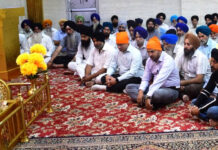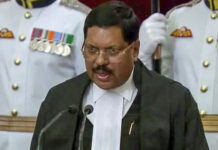NEW DELHI, Apr 1
The Supreme Court on Monday told Tamil Nadu Minister Udhayanidhi Stalin that he cannot compare himself to media personnel to seek the relief of clubbing of multiple FIRs lodged against him for his “eradicate Sanatan dharma” remarks.
During the hearing, Stalin’s counsel submitted that his intention behind making the remark was not to make a “political warcry” as he was only addressing a gathering of 30 to 40 people.
A bench of Justices Sanjiv Khanna and Dipankar Datta allowed Stalin, who is the Minister of Youth Welfare and Sports in Tamil Nadu, an actor and son of DMK supremo and Chief Minister M K Stalin, to amend his plea in view of “legal issues” and listed the matter in the week commencing on May 6.
The bench said, “You made the statements voluntarily. You cannot equate the media people with the minister. You have cited cases of media people, who have to follow the directions of their bosses and look after the TRP and other things.” The bench made the remarks on perusing the writ petition of Udhayanidhi Stalin in which he has cited the cases of Arnab Goswami, Mohd Zubair and others, who were earlier granted relief by the top court by clubbing of the FIRs lodged against them and transferring it to one police station. Senior advocate Abhishek Singhvi, appearing for Stalin, said that he has cited several cases including of journalists and politicians like Nupur Sharma where the court has exercised writ jurisdiction under Article 32 of the Constitution to transfer and club multiple FIRs lodged in different states. He said that the law applicable to the case of Nupur Sharma, a former BJP spokesperson who was suspended by the party for allegedly making objectionable remarks against Prophet Mohammed, is equally applicable to the petitioner as she is a “pure politician”.
Justice Datta said the case of Nupur Sharma is also not on the same pedestal as that of the minister (Stalin). The bench also questioned Singhvi why he was pursuing an Article 32 petition when the remedy lies under Section 406 of CrPC for clubbing and transferring of FIRs.
“You see, in some cases, cognisance has been taken and summons have been issued. Judicial proceedings cannot be touched by the Supreme Court under writ jurisdiction,” Justice Datta said.
Singhvi, along with senior advocates P Wilson and Chitale appearing for Stalin, sought time to file a compilation consisting of further FIRs/summons filed in Rajasthan and a submission note regarding the court’s query on the Supreme Court’s power to club and transfer FIRs.
Singhvi submitted that in most of the cases, section 406 was not applied by the top court.
Justice Datta said, “If that was the case, then how was Sushant Singh Rajput case transferred to CBI. I was in the Bombay High Court (as chief justice of the high court) and was hearing petitions regarding his death. Justice Hrishikesh Roy sitting in a single judge bench ordered for transfer of probe to CBI.” Justice Datta was referring to the August 19, 2020 order passed by Justice Roy in which the top court upheld the transfer of an FIR, lodged at Patna against actress Rhea Chakraborty and others for allegedly abetting the suicide of actor Sushant Singh Rajput, to the CBI. Rajput, 34, was found dead in his apartment in suburban Bandra in Mumbai on June 14, 2020. Speaking at a conference in September 2023, Udhayanidhi Stalin said Sanatana dharma is against social justice and equality and should be “eradicated’.
Likening Sanatana dharma to coronavirus, malaria and dengue, he said it should be destroyed.
While hearing the plea on March 4, the apex court had rebuked Stalin over his reported remarks and asked why he had moved the court for clubbing together the FIRs filed against him after abusing his right to freedom of speech and expression. The top court had told Stalin that being a minister he should have been careful with his statements and mindful of the possible consequences they could have.



























